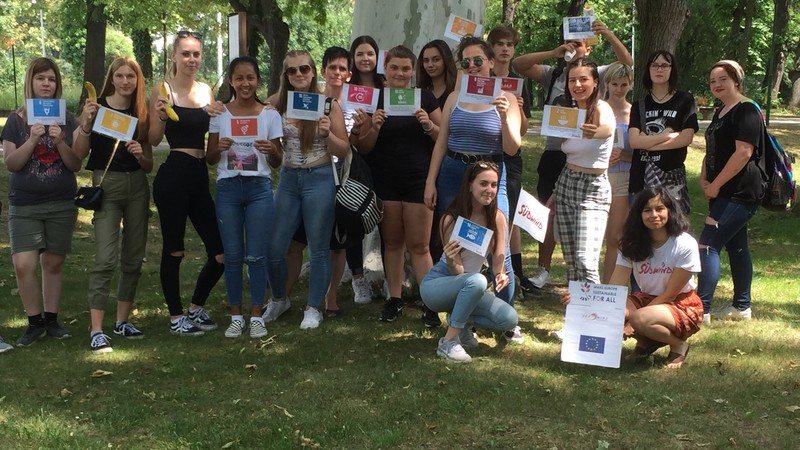
© Südwind
How is my life related to the 2030 Agenda and its 17 Sustainable Development Goals? Where can we find best practice examples in the city of Wiener Neustadt in Lower Austria? These questions were the starting point for a project funded by a sub-grant from the European Union’s “Make Europe Sustainable for All” and developed and implemented by the Austrian NGO Südwind.
The project “SDGs finden Stadt” aimed at introducing the Sustainable Development Goals (SDGs) to a wider public in the city of Wiener Neustadt. Südwind works closely with schools and other entities to inform and educate pupils and the public about sustainability and global issues. Südwind has already worked in the area of global citizenship education for 40 years. The EU project targeted young participants. Through organised “SDG city walks” in Wiener Neustadt, several interesting initiatives were spotted. The youth enjoyed joining the sustainable city tour while creating their own digital stories.
By doing guided city walks through the city centre of Wiener Neustadt, the participants gained theoretical knowledge about the 17 SDGs and could discover linkages between them and their local surroundings. The project increased awareness for global connections and interdependencies between different SDGs. The main target group were young people between 14 to 18 years who attend secondary school in Wiener Neustadt. The workshops started either in the classroom or in the Südwind office with a theoretical overview about the 2030 Agenda. The students were explained content about sustainability and development using methods of global citizenship education.
SDG ambassadors via storytelling
On the search for how sustainable development goals were achieved in the city centre of Wiener Neustadt, the students became ambassadors for the SDGs themselves. Part of their journey was not only to discuss topics like poverty, education or sustainable production and consumption patterns – among others – but also to shoot short video sequences and explain the importance of the SDGs for society. Storytelling can be used as a tool or strategy to inform people about abstract issues on a very personal level by sharing their own story, e.g. how their life was affected by climate change. The students visited best practice examples like the zero waste shop “Schmeckerei” which uses plastic free products from local farmers that produce organic food (SDG 12: responsible consumption & production), the first and only vegan & vegetarian restaurant in Wiener Neustadt “Papa’s Kitchen” (SDG 13 climate action), a shop with fair trade products “Weltladen” (SDG 8 decent work and economic growth) and an urban gardening project “Obststadt” (SDG 15: life on land). This format allowed for discovering unfamiliar places that have found innovative ways to contribute to sustainability and to discuss responsible solutions for problems in the town right at the spot, like the drinking fountain and the public sanitary facilities in the city centre (SDG 6: clean water & sanitation) or the reflection on street names like “Frauengasse”/“Herrengasse” (“women’s street” vs. “men’s street”) in relation to equal rights and possibilities (SDG 5: gender equality). It opened up the opportunity to discuss and question alternatives and to meet people who are actively involved in local projects. Furthermore, the city tours had the positive side effect of including other pedestrians in the city centre as observers and even participants in discussions.
Make Europe Sustainable for All!
The youngsters were inspired by the variety of options for how to contribute to a more sustainable and fairer world. The idea of getting involved through active citizenship in their own region, in particular, was a fruitful thought and spurred interesting discussion for the participants. In order to create a fairer and more sustainable world for future generations, enhancing the participation of the younger generations is a key element for the success of the SDGs.
The participants’ conclusion was clear: Make Europe Sustainable for All!
Links
Youtube: https://youtu.be/7l1vzmzvfSo
The full text is also available on the website of SDG Watch Europe.
This article was written by our guest author Südwind Niederösterreich. The opinions expressed and the arguments employed therein do not necessarily reflect the official views of SDG Watch Austria or the media owner ÖKOBÜRO .
-
Nachhaltigkeit im Betrieb: gut beraten in die Zukunft
Oct. 20, 2025
-
FfD4 2025: Die Konferenz, die die Zukunft der globalen Entwicklungs-finanzierung entscheidet
April 29, 2025
-
Green Deal und Menschenrechte in Gefahr
Feb. 26, 2025
-
Nachlese: SDG Dialogforum Kärnten, 13.11.2024
Dec. 3, 2024
